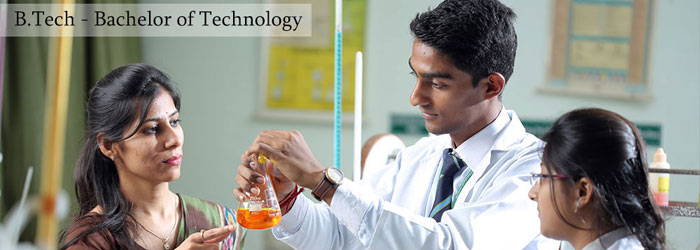What is the full form of B.TechB.Tech: Bachelor of TechnologyB.Tech stands for Bachelor of technology. It is an undergraduate engineering degree awarded in many countries like India, the USA, Norway, Canada, Australia, New Zealand, etc. It is also spelt as BTech. The duration of this degree program is 3 to 4 years depending on different countries and universities. In India, it is a year undergraduate degree program which is divided into eight semesters. 
Some of India's top institutes and universities that provide a bachelor of technology degree are as follows:
Minimum criteria to get admission in B.TechCandidate must have completed 10+2 with Physics, Chemistry and Mathematics. Or, have a 3 years diploma in any engineering stream to get admission in the Second year (Lateral entry) Popular branches of B.TechA candidate who has completed the B.Tech degree in any of its branches is designated as an Engineer. Some of the popular branches of B.Tech are as follows:
How to take admissionGovernment (Central and State) conducts an entrance exam to take admission to engineering colleges. Some private colleges also conduct their own entrance tests. These are some popular entrance tests for B.Tech:
Examinations specific to the B.Tech Institute:
Skills needed for a B.TechAn engineer needs to be socially and emotionally intelligent in addition to having excellent technical skills. It is necessary to combine compassion, empathy, insights, knowledge, rationality, and skill. Engineering is a career that someone could consider if they have a creative, innovative mind that wants to go further into issues and use logical thinking and reasoning. Through its four-year comprehensive study programme, B. Tech teaches both interpersonal and common and practical technological abilities. Students' teamwork is fostered, they become more exact and precise, their communication skills are enhanced, and they learn resilience and self-control. Features of B.Tech:
Top RecruitersGoogle, Apple, ISRO, Microsoft, Amazon, Flipkart, Intel, TATA Consultancy, Hindustan Unilever Limited and other companies. Career opportunities following a BTech courseFollowing completion of a B.Tech., According to the specialisations selected by applicants, the following job opportunities are listed: Engineer in computer science: Also known as a computer engineer, this person is in charge of developing, testing, and evaluating the computer programme. Frequently, they are involved in the development of software and video games. Mechanical Engineer: Mechanical engineers mostly create power-generating equipment. Examples of these equipment include air conditioners, internal combustion engines, turbines, freezers, and even electric generators. Civil engineer: An expert in planning, designing, building, maintaining, and managing infrastructure while taking into account the effects on the environment and public health is known as a civil engineer. Automobile Engineers: Automobile engineers are experts who work on the development of cars, trucks, buses, motorcycles, and other forms of vehicles. Automobile engineers also develop new products and modify existing ones. Marine engineer: An expert in designing, building, testing, and restoring ships, boats, undersea craft, offshore platforms, and drilling equipment is known as a marine engineer. To create various varieties of sea vessels, a marine engineer frequently collaborates with naval architects. Aeronautical Engineer: A person who works with aircraft is an aerospace engineer. He or she is primarily concerned with designing propulsion systems for aircraft. The aerodynamic characteristics of construction materials and aircraft are another area of study for an aeronautical engineer.
Next TopicCCTV Full Form
|
 For Videos Join Our Youtube Channel: Join Now
For Videos Join Our Youtube Channel: Join Now
Feedback
- Send your Feedback to [email protected]
Help Others, Please Share










